Student Projects
Student projects cover a wide range of topics including:
- Latest trends and strategies in private equity investing
- Strategically positioning or re-positioning your new fund
- Formulating an entry strategy for your firm into a new geographical market
- Screening of interesting investment targets
- Surveying junior partners in your firm to surface any organisational issues your firm may be facing
- Studying and evaluating a historical deal
To learn how to submit a project proposal, please click here
Below is a selection of our "Best in Class" student projects from our MBA classes.
October 2021
Impact Investing Private Equity Market Mapping
Mandy Bowers, Nino Alvarez, Eva Iljaz, Santiago Arizu, Isabel Kong (Class of MBA'21D)
This project entails a review and analysis of the private equity landscape for Impact Managers, including but not limited to; market mapping of impact managers, shaping narrative on impact investing themes and recommendation from the INSEAD team.
October 2021
Corporate Innovation through Venture Building
Alessandro Rampazzo (Class of MBA'20D)
The market has many different ideas as to what 1. Venture building means and 2. How to create ways to orient different goal within Venture Building. Hence, the first chapter of this study aims to better understand the market as well as find ways to better communicate the venture building ideas with the clients. The objective of the second chapter is to complete the analysis of Corporate Venture Building started with “Corporate Innovation through Venture building” through an inside-out perspective on Corporate Venture Building.
April 2021
Aj Gauravdeep , Maximilian Geirhos , Felix Lienau , Christoffer Karlsmose Andersen (Class of MBA'21J)
This project evaluates exit options for Krakakoa - a bean-to-bar chocolate maker from Indonesia, by comparing historical consumer packed goods (CPG) deals.
April 2021
Laura Rivera, Abhinandan Jain, Guillaume Iserin, Sangwoo Pak, Ingrid Vallee, Jermayne Chan (Class of MBA'21J)
The main objective of this study is to understand how CVCs contribute to corporate strategy and how they affect deals and exits. The study also provides key learnings for corporations to setup successful CVCs.
April 2021
KK Fund – Growth Strategy for VCs
Max Sumargo, Ivanina Stoyanova, Grace Tham, Sky Song, Jacob John Kuttisseril, Charles Bernard (Class of MBA'21J)
This project aims to describe the best practices globally by VC firms that KK fund - a Singapore based VC firm, looking to adopt innovative practices to scale presence in SEA - can model after by conducting in-depth analysis on VC successes and best practices through desk research and interviews with VCs and VC-backed firms.
April 2021
The Future of Boards and The Board of the Future
Yvonne Chang, David Davies, Markus Hoess, Michael Lau, Bella Xu, Ke Xu Zhou (Class of MBA'21J)
This project aims to develop a perspective on the trends affecting company board governance (the “Future of Boards”). Specifically, how trends such as diversity, remote work, ESG, amongst other items, are affecting and shaping boards, with a focus on differences between public and private boards have been analysed through a series of interviews with board directors. Based on these analyses the project also seeks to identify what the Board of the Future should look like in terms of operating model, use of technology, and impact of ESG on its function.
October 2020
Mariela Atanasova (Class of MBA'20D)
Based on 40+ interviews with VCs and Angle Investors the “Defensible Startup” report aims to offer a defensibility (moats) framework and set of examples of how different companies got started on their journey towards architecting and constructing their moats – i.e. to try to make a connection between early actions taken by founders and eventual moat outcomes.
October 2020
Investing at the Crossroads of Biotech & Food
Hoon Cho, Gavin Evans, Ruchi Hotchandani, Tadahiro Maeda, Oliver Towndrow (Class of MBA'20D)
Food sector continues to look like an attractive segment to be focused on, given strong fundamentals. There is a significant opportunity for biotechnology players in this segment, whether focused on improving current system (e.g. crop yield optimisation) or pushing new innovations (e.g. precision fermentation, cultivation). Funding in biotech x food space is growing quickly, increasing to €1b+ range within a matter of 5-10 years. This project aims to frame the intersection between biotechnology & food, map the relevant start-ups in this space, review the active funds and provides high-level recommendations for new investment entities.
October 2020
LEGO Ventures Analysis Proposal Investment Decision in Digital Play in Asia
Alex Lin, Wendy Wu, Amanda Tay, Vincent Tordo, Chris Zhan, Alessandro Di Marzio (Class of MBA'20D)
LEGO Ventures is looking to invest in Digital Play which consists of video games, social play experiences, and support services in Asia. This project provides a summary of potential investment candidates sourced by the project team and validated by LEGO Ventures. In addition, each candidate contains a deeper and candidate-specific qualitative analysis based on questions proposed by LEGO Ventures.

october 2020
Southeast Asia VC HealthTech Landscape
Danny Strauss, Isaac Bang, Josiah Liang, Mokshda Wanchoo, Raoul Laitat , Zarah Liu (Class of MBA'20D)
The HealthTech sector in SEA saw record breaking funding levels in 2019 as deal volume rose at a 63 CAGR. 2 of the 5 largest SEA HealthTech deals in 2019 are based in Indonesia Halodoc and Alodokter while the others are based in Singapore. This project assesses the SEA HealthTech landscape from a VC lens by providing macro review of the healthcare and eHealth space and trends in addition to an overview of numerous startups and VCs currently active in the region.

October 2020
MAPAN: Driving Impact from Birth Beyond Exit
Hongmin Choi, Roy Chen, Peter Peng, Ruilong Guo, Vikram Maran, Yu Zhang (Class of MBA'20D)
This case describes how PT Rekan Usaha Mikro Anda (“PT RUMA,” “RUMA,” or known by its trading name “Mapan”), a social enterprise in Indonesia, leveraged the support from Impact VCs and grew from a small tech start-up to a pan-Indonesia presence that was eventually taken over by Gojek. Apart from making a significant social impact by lifting millions of poor Indonesian families out of poverty, the deal represents one of the earliest successful impact VC investments and one of the largest impact VC deals to date in Southeast Asia. It continues to encourage and attract more impact VC capital to flow into this part of the world.
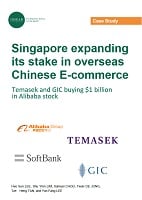
October 2020
Singapore Expanding Its Stake in Overseas Chinese E-commerce
Hye Sun Lee, Shu Yinn Lim, Samuel Choo, Twan De Jong, Tze Heng Tan,Yun Fang Lee (Class of MBA'20D)
In June 2016, Singapore’s state-owned investment firms GIC and Temasek Holdings purchased a combined US$1B of stock in Alibaba Group Holding from Japan’s Softbank Group, the largest investor in Alibaba at that time. This case examines the context of the sale and the motivations of the investment firms.

October 2020
Re-thinking Private Equity Risk and Reward for LP Allocations
Joseph Cheng, Yaser Farook (Class of MBA'20D)
This paper attempts to provide a balanced, evidence-based answers to four questions regarding private equity allocations: (1) Does private equity provide higher returns, lower volatility, and diversification benefits for institutional investors? (2) Can private equity returns be replicated with a public market strategy? (3) Do private equity lockups enhance returns or increase risk? (4) What are the implications for LP allocations to private equity?
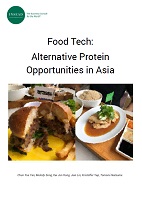
October 2020
Food Tech: Alternative Protein Opportunities in Asia
Chun Yue Tan, Melody Song, Kai Jun Hong, Jian Lin, Kristoffer Yap, Tomomi Natsume (Class of MBA'20D)
Investors ranging from sovereign wealth funds and venture capitalists have ploughed increasing amount of funds into alternative protein companies. Funding in 2020 is on pace to outstrip previous years, with the amount of money raised in the first quarter of the year already dwarfing all of 2019. This study dives deeper into the trends, players and opportunities in Asia’s alternative proteins space. Specifically, the report zeros in on the 5 broad sectors in alternative proteins – Cultivated Meat, Fermentation, Insect Protein, Whey Protein and Plant-Based Protein.

April 2020
Resilient Returns Navigating PE in ESG and Post COVID-19 World
David Kukulies, Bas van Marle, Bartek Walentynski (Class of MBA'20J)
The main purpose of this report is to outline how non-financial factors such as ESG considerations can be incorporated by General Partners (GPs) to drive their risk-adjusted returns. The report also provides a perspective on how GPs should act in the short-term to avoid pitfalls and leverage opportunities connected with the ongoing COVID-19 crisis.
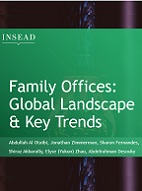
April 2020
Family Offices: Global Landscape and Key Trends
Abdullah Al Otaibi, Jonathan Zimmerman, Sharon Fernandes, Shiraz Akbarally, Elyse (Yukun) Zhao, Abdelrahman Desouky (Class of MBA'20J)
This project provides a macro overview of family offices as well
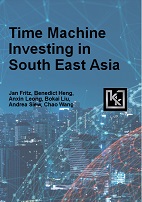
April 2020
Time Machine Investing in South East Asia
Jan Fritz, Benedict Heng, Anxin Leong, Bokai Liu, Andrea Siew, Chao Wang (Class of MBA'20J)
Chinese companies are widely regarded as pushing the technological and innovation frontier as well as successfully introducing and scaling new business models . In many regions across the world and, in particular, South East Asia (SEA), similar technologies and business models seem to be adapted. There appears to be a time lag between the successful adoption in China and elsewhere, as, for example, significant time lags between China and South East Asia in the founding dates of successful start-ups can be observed. In order to obtain a comprehensive and unbiased perspective on this phenomenon, this project analyses past investments across industries in China and SEA.
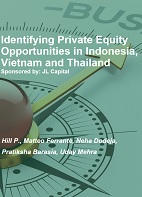
April 2020
Identifying Private Equity Opportunities in Indonesia, Vietnam and Thailand
Hill P., Matteo Ferrante, Neha Dodeja, Pratiksha Barasia, Uday Mehra (Class of MBA'20J)
This project examines private equity opportunities in promising industries in Indonesia, Vietnam and Thailand. The following three markets are analysed in detail: Fintech opportunities in Indonesia, Consumer Retail in Vietnam and Food Manufacturing in Thailand.
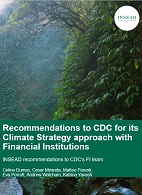
April 2020
Recommendations to CDC for its Climate Strategy approach with Financial Institutions
Celine Dumas, Cesar Miranda, Matteo Parenti, Eva Perrett, Andrew Watcham, Katrina Yavash (Class of MBA'20J)
Climate change is a worldwide risk that generally impacts emerging countries more than developed countries. Climate risks can have a material impact on both the real economy and the financial system. The overall finance industry is moving towards ESG and institutional investors towards “green” impact investing. This study represents INSEAD team’s own independent recommendations to CDC and its Financial Institutions (FI) team and is expected to inform CDC’s own strategy which is being developed independently.
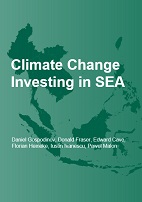
April 2020
Climate Change Investing in SEA
Daniel Gospodinov, Donald Fraser, Edward Cave, Florian Heineke, Iustin Ivanescu , Pawel Malon (Class of MBA'20J)
Climate-change investment has experienced substantial growth and popularity globally, with investor preference shifting towards ESG-friendly activity. This study provides an overview of climate change investing landscape in SEA which is destined to be the next big market.
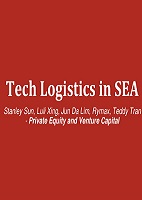
May 2019
Stanley Sun, Luli Xing, Jun Da Lim, Rymax Joehana, Teddy Tran - (Class of MBA'19J)
Driven by the rapid growth of e-commerce , increasing international trade and investment and improving infrastructure, the SEA logistics is poised for disruption. This report breakdowns market analysis in four areas (1) The warehousing landscape where generally large e-commerce players internalize their warehousing capabilities, but many opportunities lie in underserved 2nd tier cities and urban areas. (2) The transportation landscape remains asset-heavy , however it presents unique opportunities for operational excellence or optimal utilization (3)The last mile delivery landscape holds many opportunities in fulfilling consumer preferences for quicker deliveries and package tracking, but is facing increasing fragmentation. (4) Cross-border logistics landscape, high cross-border e-commerce activity in Singapore and Malaysia is observed and foresee other markets following suit as their mature. This growth, coupled with the lack of existing players with local expertise in customs clearance, indicates a strong area of opportunity in this space.
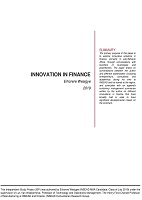
May 2019
Eihorere Wesigye
The primary purpose of this paper is to explore innovative solutions in finance, primarily in sub-Saharan Africa, through conversations with founders of businesses and practitioners. The paper draws on conversations between the author and different stakeholders (including entrepreneurs, consultants and academics) during his time at INSEAD and his travels to the region, and concludes with an appendix containing management summaries written by the author on different innovations in finance that have broadly had or seek to have significant developmental impact on the continent.

January 2019
Value Creation – As Seen from Asia and Ride-Sharing
Jonathan Siew
The purpose of this study is to understand Value Creation from the perspectives of selected technology sectors and Asia. The study takes a global view first before zooming in to Asia, followed by exploring the value creation definition and understanding how this could play out within venture-backed growth companies in transportation (ride-sharing) through Uber and Grab. The study concludes with some reflections on value creation based on these cases.

October 2018
The Emerging Role of Venture Builders in Early-Stage Venture Funding
Jonathan Bariller, Huub van Verseveld, Andrew Locke, Niel Wyma, Boris Spirov
This student project draws on insights from the Venture Builder (VB) industry’s key innovators to present an assessment of the role venture builders currently play in the venture market. It seeks to disentangle the overlapping terminology of the venture industry, providing clarity to the VB operating model and its current global footprint. It then attempts to isolate the key attributes of successful (and unsuccessful) VBs. Finally, the report predicts the role that VBs might play in the future and also identifies industries that are best suited to the VB model.
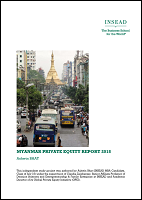
July 2018
Myanmar Private Equity Report 2018
Ashwin Bhat
Myanmar, having gone through sector-wise liberalisations and formed a newly elected government in 2016, continues to present opportunities and challenges for investors – PE and otherwise. While the complexity of the country has proven too much for many, a growing number of GPs have now committed to the country and are steadily deploying funds. This report’s goal is to build on its 2015 predecessor to provide concrete, actionable recommendations to private equity firms looking to invest in this unique and exciting market.

June 2018
The Emergence of Long-Term Capital in Private Equity
Kyle Lee, Konstantin Synetos
Private equity has seen a nascent but visible surge of general partners raising long-dated funds in recent years, with fund lives in the range of 15-20 years. While this may be nothing new to those familiar with infrastructure investing, this is a meaningful deviation from the traditional PE model of a ten-year fund. Integrating key insights gleaned from a series of interviews with an assortment of industry participants including GPs, LPs, legal advisors, placement agents and consultants, this project aims to shed some light and thoughts on the inner workings of long-dated funds, investing with a longer-term horizon, and how these can redefine or shape the various facets of traditional private equity.
April 2018
China's Venture Capital: Bigger than Silicon Valley's?
Ariel Lu, Jessie Chen, Frank Fu
As of 2018, China is the second largest venture capital (VC) market in the world by aggregate deal value and number of unicorns. This report examines the factors that drive the growth of China's VC, and looks at the similarities and differences between China's VC market and that of the United States. The students also interviewed a number of industry players on their outlook for China's VC as well as the risks and challenges that China may face going forward.
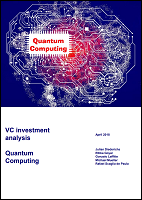
April 2018
Quantum Computing Investment Analysis
Julian Diederichs, Ritika Goyal, Gonzalo Laffitte, Michael Mueller, Rafael Scaglia de Paula
This project provides a good introduction to venture investment in quantum computing. It explains what quantum computing is, traces its evolution and highlights its recent breakthroughs and challenges. This is followed by a review and analysis of the investment landscape

April 2018
Financial Inclusion Market Exploration – Southeast Asia
Ashwin Bhat, Nikita Bukreyev, Pranav Mehrotra, Dario Steiner, Jiri Waldhauser
The project sheds light on VCs, startups and trends in the financial inclusion space in Southeast Asia. It analysed the attractiveness of each country's financial inclusion ecosystem based on three key dimensions: the presence of market enablers, regulatory framework and market opportunity for four categories of financial inclusion products. Interviews were also conducted with 14 fintech/financial inclusion experts on Southeast Asian market for a deeper understanding of the region's financial inclusion markets and trends.
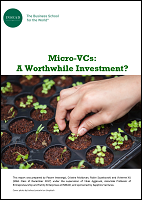
December 2017
Micro VCs: A Worthwhile Investment?
Pasarn Intarangsi, Cristina Moldovan, Robin Szustkowski, Vivienne Xu
This paper presents a top-down analysis of the Micro-VC space in the U.S. and Europe. It seeks to answer the key question of whether these types of funds (VC funds under $100m) represent an attractive investment opportunity for institutional LPs, and what sets apart the best performing funds. Starting with industry sizing and aggregate performance results, the students utilised a mix of quantitative and qualitative analyses to construct arguments for and against Micro-VC as a category, before presenting their recommendation.

October 2017
Fintech and the Disruption of Retail Trading: Trends and Case Studies
Warren Lee, Theodoros Evgeniou
This report aims to provide useful insights on the latest trends in fintech to venture capitalist, start-ups, financial institutions and other stakeholders including policy makers and regulators. It draws on data provided by industry recognised sources as well as interviews with a number of Fintech start-ups and subject matter experts. The report includes six case studies to illustrate the trends identified.
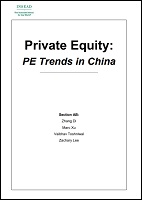
August 2017
Private Equity Trends in China
Zhang Di, Marc Xu, Vaibhav Toshniwal, Zachary Lee
China's private equity industry is flourishing and many established global funds are growing their presence in China while domestic funds are emerging at an incredible pace. This report provides an overview of the PE industry in China and highlights the latest trends in fundraising, target industries/ firms, types of investments, exits, and LPs' expectations and strategies for this market. The report also examines the impact recent changes in regulations, such as capital controls introduced in 2016, have on the industry.

April 2017
The Private Equity Career Path
Chen Yu, Khamitov Timur, Parkov Vladimir, Tan Annie, Viswanadha Kaushik Siriam
The objective of the project is to better understand the profile of INSEAD alumni working in the private equity industry as well as to learn from these alumni how to pursue a career in private equity. This report summarises survey findings from 86 respondents focusing on their background prior to switching to private equity, their motivation and challenges, and the role of INSEAD in their PE careers. It also includes detailed interviews of two alumni who hold senior positions in large and well-known PE firms. The interviewees shared their stories and experiences which we hope would be helpful to aspiring students.

August 2016
Private Equity in Emerging Markets
Raphael Schmid Vantroost
This essay analyses the differences between developed and emerging markets' private equity buy-outs and examines how general partners can improve their chances to succeed based on a mix of research and personal experiences.
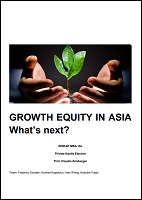
April 2016
Federico Escaler, Konrad Kapeluch, Ivan Wong, Keisuke Fujita
Over the last 15 years, annual capital deployed by PEs in Asia grew at a healthy 17% CAGR (vs. the global average of 9% CAGR) with a disproportionate focus on one type of investments – growth equity, a.k.a. minority-stake investments. This report examines the key dimensions of the growth equity market in Asia, looking at the growth drivers, competitive landscape and key capabilities required from GPs to participate in this expanding market. Interviews were also conducted with GPs and LPs for a more informed and relevant perspective of the market.
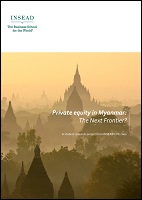
June 2015
Akaporn Rodkong, Andres Arguello, Cesar Friol, David Nothacker, Khant Khant Kyaw
This report highlights the opportunities and challenges in Myanmar’s nascent but growing private equity space. It looks at every step of the private equity process, including originating deals, evaluating deals, executing deals, making deals successful and harvesting deals. It concludes by providing a series of recommendations to private equity professionals interested in investing in Myanmar.

October 2014
New Market Exploration in Nigeria
Alexandra Albers, David Bondatti, Dominique Cina, Omar Elassar, Anthony Khawam, Georges Nakhle
By studying the macroeconomic and financial inclusion landscape of Nigeria, the students made recommendations to Accion's Venture Lab – an investment initiative that provides seed capital and support to financial inclusion start-ups – on the market segments and potential targets to focus on for their fund.

April 2014
Financial Inclusion Investment Landscape: Indonesia and Vietnam
Linda Hogel, Karim Mansouri, Iti Jain, Subu Wuppalapati, Amy Xu, Veronika Patkai
This report provides a market assessment of the financial landscape of Indonesia and Vietnam to help Accion's Venture Lab determine the potential of these countries for their seed capital fund to support financial inclusion start-ups. It includes analysis of factors such as: bottom-of-the-pyramid need, penetration and affordability of banking services, microfinance penetration, mobile and banking-related infrastructure, business environment, investment and innovation indicators and key players, etc.

December 2013
Trends in First-Time Fund Management in Asia Pacific
Austin Arensberg
This report focuses on first-time fund managers in the Asia Pacific region. Based on surveys with private equity and venture capital professionals in the region, it outlines the hurdles first-time fund managers face while fundraising and deal sourcing, and puts forward strategies to successfully overcome these obstacles.

October 2012
African High Yield Corporate Bond Market
Alon Lits, Neha Shah, Xavier Sagnieres, Shiva Tiwari, Nic Smalle
This report analyses the African corporate bond market, covering specifically the following topics: overview of high yield corporate bond market, competitive landscape: bond funds which invest exclusively in high yield issuances, who are the main high yield corporate bond holders, and who are the main high yield corporate bond holders in Latin America and Asia (direct and indirect).

May 2012
Opportunities in the Chinese Logistics Industry
Gift Anankaphannan, Wenting Wang, Eric Liu, Hardy Zhang, Terrance Fang, Denise Cai
In this report, the students analysed the Chinese logistics industry including its market size, segmentation and competitive landscape. Based on their analysis they highlighted the key challenges and opportunities faced by the industry. The report also included a study of some of the deals that existing PE/VC firms have invested in the logistics industry.
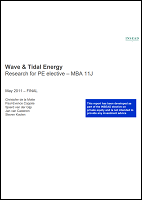
May 2011
Investing in Wave & Tidal Energy Projects – with the support of PE funding
Christofer de la Motte, Paul-Evence Coppée, Sjoerd van der Gijp, Jan van Casteren, Steven Koolen
The aim of this report is the identification of companies that have developed technologies to generate energy from tidal or wave power and have the potential to grow rapidly in the next 3-5 years with the support of PE funding. The target deal size was up to STG 10 million and the project focused on growth capital and late-stage venture type deals. In line with the profile of the sponsoring firm, WHEB Vision, the students focused on European opportunities but started with a broad summary of the global trends in this up-and-coming industry.

April 2011
Private Equity Opportunities in Nutrition and Active Lifestyle
Matthias Breunig, Sahar Golestani, Armando Gomez, Swati Sawjlany, Dhwani Vahia
The research report was conducted to determine the attractiveness of the nutrition and active lifestyle space in North America and Europe for private equity investment. This entailed decomposing the nutrition and active lifestyle industries into numerous segments and sub-segments and defining criteria to evaluate attractive market segments (e.g. growth rate, market size). Subsequently, based on market analysis, three key segments that best met the pre-established criteria and were deemed most interesting for investment were identified: Food Allergy/Food Intolerance, Organics and Sports Nutrition.
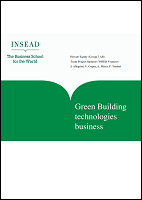
October 2010
Green Buildings – Rapid Growth with Private Equity?
J. Allegrini, V. Gupta, A. Misra, F. Tentori
The students worked with WHEB Venture’s team to identify companies in the Green Building space. Those firms develop technologies to create resource efficient and environmentally responsible buildings. This industry is expected to grow rapidly over the next 3-5 years and would certainly benefit from private equity investment. WHEB Venture invests in cleantech companies with high growth potential and is supported by the European Union through its Competitiveness & Innovation Framework Programme (CIP).
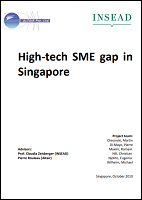
October 2010
High-Tech SME Gap in Singapore
Martin Checinski, Pierre Di Mayo, Romain Maxim, Christian Nill, Eugenia Njolito, Michael Wilhelm
The report drafts recommendations for the investment community and government bodies in Singapore on how to make Singapore's high-tech SMEs economically sustainable. Starting with an analysis of the strengths and weaknesses in the industry, the project offers tools, strategies and management techniques to achieve sustainability and rely less on external funding. This project was sponsored by Altair Pte Ltd, Singapore.

June 2010
Real Estate Private Equity in Asia: Trends, Risks and Opportunities
Charles Chen and Charul Patel
This independent study project explores and examines the intersection of real estate and private equity in Asia, and specifically tries to better understand the current investment trends, risks and opportunities in the region.

March 2010
The Role of Government in Venture Capital Development in Hong Kong
Frankie Wai
Governments around the world have been playing an important role in fostering innovation and entrepreneurship. This essay highlights the key government initiatives, discusses and analyses the current issues, and projects the future role of government in venture capital development in Hong Kong.
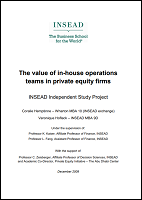
December 2009
The Value of In-house Operations Teams in Private Equity Firms
Coralie Hemptinne, Veronique Hoflack
This report analyses the value of in-house operations teams in private equity firms. It gives a description of the prevailing models for in-house operations teams, the pros and cons of each model and the challenges related to having an in-house operations team.
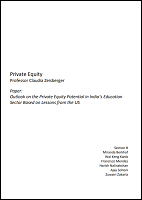
October 2009
Outlook on the Private Equity Potential in India’s Education Sector based on Lessons from the US
Miranda Berkhof, Wai Keng Kwok, Francisco Mendes, Harish Nalinakshan, Ajay Sohoni, Zuwairi Zakaria
There is an increased focus on less traditional PE sectors such as education and healthcare. India seems an ideal market because of its demographics and an economy focused on services. The US, as the more mature and successful big brother of the Indian education sector, offers rich insights for an outlook. This report, based on extensive secondary research and interviews, highlights the opportunities and challenges for private equity in the Indian education sector.

April 2009
Assessment of Early Stage Investment Opportunities in China (Eastern Bell Venture Capital)
Weimiao Guo, Zephyr Hsu, Laura Liu, Victor Wan, Jeremy Yu
In the past few years, although the VC industry in China has developed rapidly, early stage has been somewhat neglected. As there are numerous investment opportunities across several industry sectors in China, it is sometimes difficult for an early-stage fund to maintain discipline in terms of scope/industry focus. This report thus aims to identify the biggest opportunities in the Chinese market based on the latest macro data.








